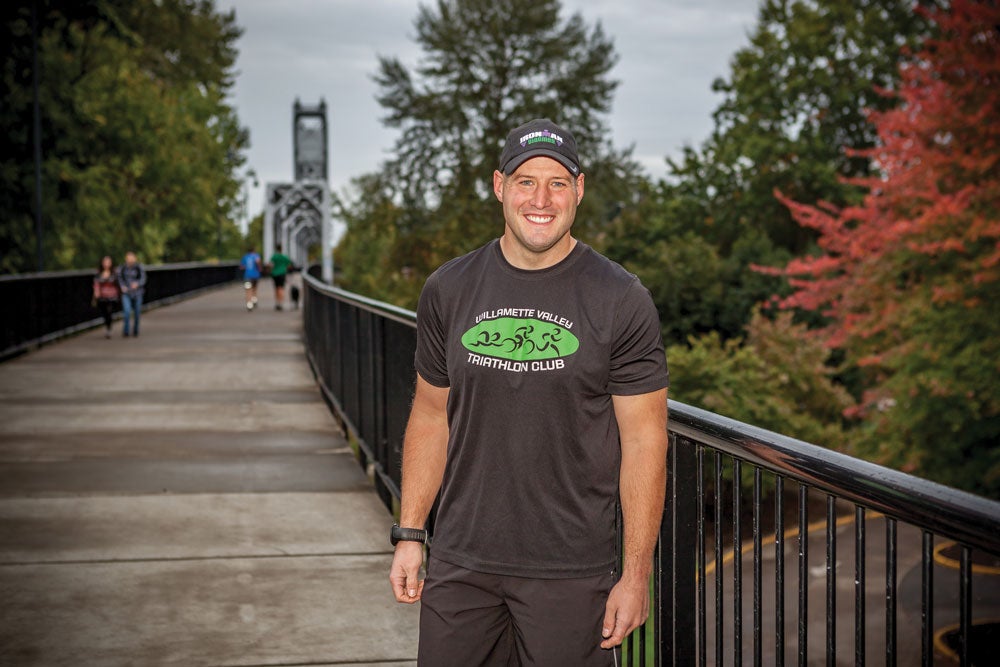An Iraq Veteran's Stirring Path to Triathlon

Photo: Erik Bishoff Photography
Exposure to a cancer-causing chemical agent while serving in Iraq motivated Kelly Hafer to start racing.
While serving in Iraq as a member of the Oregon National Guard in 2003, Kelly Hafer began to suffer frequent nosebleeds, a skin rash and shortness of breath. For six years he suffered symptoms he thought were caused by spending time in the desert until a life-changing letter from the Army arrived in 2009 that directed him to the U.S. Department of Veteran Affairs to explain the onset of his symptoms. While guarding a water treatment facility in the Basrah oil fields at Qarmat Ali, Hafer and approximately 830 other service members were exposed to sodium dichromate dust, a chemical known to cause cancer. The chemical was used as an anti-corrosion agent by previous workers at the plant and was found on the ground after bags were opened at the site.
A doctor told Hafer he was in the middle of a 20-year window in which he could potentially develop cancer as a result of his exposure. After 20 years, he will not be in the clear entirely, but the chances of a cancer diagnosis will be greatly reduced. As a husband and father of five girls, Hafer didn’t want to take any chances—he chose to improve his health to be in the best shape possible.
“Dwelling on it wouldn’t do any good,” Hafer says. “If I get sick, I need to be ready to fight.”
Hafer wrestled in college but hadn’t taken great care of his health since the end of his service in 2005. After the letter in 2009, he gradually started to lose weight through diet and mild exercise. As the weight came off, he started jogging and tackling more challenging terrain during his hunting expeditions. “I have never been one for gym memberships nor personal trainers, so it was a struggle to exercise in any kind of a consistent routine,” Hafer says.
Hafer recognized he could improve his fitness, though, and in 2013 a friend talked him into trying a sprint triathlon. Despite feeling like he was “going to die” at the end, Hafer was hooked. He finished an Olympic-distance race a few months later and did a long-course event the following year. In May 2016, Hafer won the Clydesdale division at the Troika Long Course triathlon in Spokane, Wash., with a time of 5:45:44, taking 52 minutes off his time from the previous year.
Next, Hafer shifted his attention to training for a full Ironman, and completed the inaugural Ironman Vineman in 14:44:25. “Starting triathlon gave me motivation to get at least one run, bike and swim in a week while in training,” he says. “Training for an Ironman took a whole other level of routine and dedication.”
Hafer said he would not have gotten into triathlon if it had not been for his exposure to the cancer-causing chemical in Iraq. While that experience has presented its own set of challenges, including ongoing nosebleeds and skin issues, he is grateful to have discovered triathlon.
“I’m in the best shape of my life, and that’s a huge blessing,” he says. “I can go for 15 hours straight and be all right.”
Hafer revels in the discomfort of triathlon, comparing the struggle of the last few miles of the marathon at the end of an Ironman to the agony of completing a 10-day field exercise in the Army. The sense of accomplishment that comes from completing a hard race combined with the feeling of camaraderie with other athletes have made him a triathlon devotee.
He’s now passing that passion on to his daughters (ages 2–11) who are starting to get involved in local running events. The love and support from his family have helped Hafer deal with his condition, making his story an inspiring reminder of the importance of keeping life’s challenges in perspective and the profound impact triathlon can have in dealing with difficult circumstances.
“I am grateful that I know the cause of my symptoms and have found a way to live with and push past them,” he says. “Triathlon has been a big part of that.”